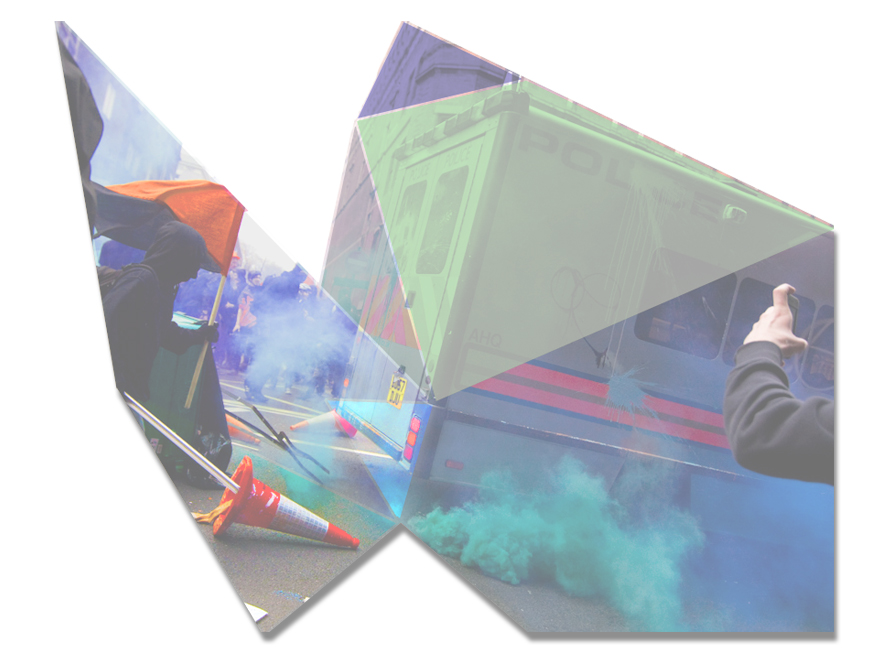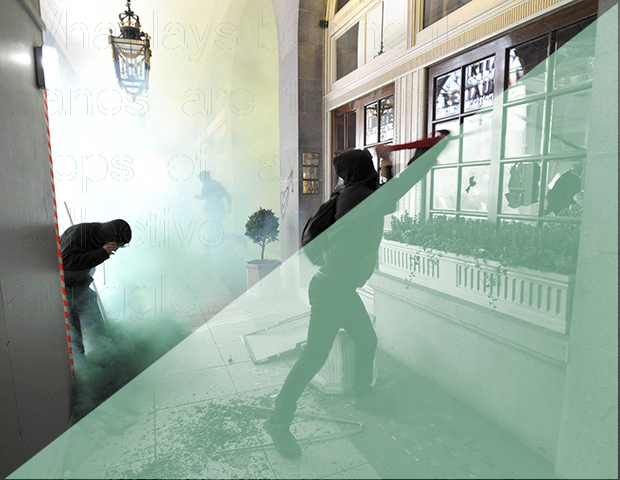I don’t want to mask up.
At least, I don’t want to mask up, or hide my identity from you, alongside whom I marched on the 26th. I’d like to be able to talk to you, or argue with you, even if we disagree. But we don’t have that choice: to hide our identity in a surveillance culture is a choice that doesn’t permit any selection. Anonymity is not in itself an end – it would be a pretty useless one – but a means of taking action in a culture where dissent has been gutted of all potential under the watchful lenses of CCTV cameras and surveillance teams.
It is a choice, yes. That choice is made on the brink where analysis tips over into action. The defenders of ‘Black Bloc’ explain that it is a tactic, rather than an organisation – that it is, in other words, simply a means of acting. Why choose it?
For some, it is a tactic of last resort, inhabiting the far end of a spectrum that stretches from writing to MPs, to marching, to the anonymous destruction of property, all representing differing intensities of action, a tool within a wide arsenal aiming to pressure those in power. But this elides a political difference. The black bloc tactic is not simply on a continuum with those tools, but is a different species of action, one which rejects the premises on which many others are founded. Its refusal of identity, and its refusal of the logic of simple registration of disagreement, is rooted in a recognition that the ‘peaceful’ demonstration changes nothing, challenges nothing, achieves nothing but a torpid and futile walk towards resignation.
Why do we act? The imposition of austerity by the few and the wealthy demands action. How? Those who remember the anti-war demonstrations from the beginning of the century know that numbers achieve nothing; that to turn up in our thousands makes not the slightest impact on those in power. Power loves a good march: it enables governments to cloak themselves in a veil of pluralism – a veritable triumph for democracy, after all, even if no one intended to listen to you – or enables a craven opposition (which would cut ‘deeper and harder than Thatcher’, lest we forget) to co-opt your protest as a wave upon which to launch their party back to power. At what point were you heard?
We were sold on a lie a long time ago: you’re presented with the option of protesting and marching as a way of registering your dissent, of making your mark, as if our society operates like the most hallowed of debate chambers, where ideas meet each other in purity and reason, and through debate the most meritorious course of action is decided. But the dice are loaded and the house is bent: this is a power struggle, in which the act of registration, the signifying of dissent, ends up another way of someone else scoring points, some other virtually indistinguishable politician seizing the reins of power. Your voice is recuperated to their ends. ‘Not in my name’ is a gift to power – as if by turning up you’ve made the check against your name, done all you could, now all you can do is watch them ignore it or use it to their own ends. What is left, when the dice are so loaded, but to overturn the table?
In going masked-up, in smashing a pole through a bank window, in spattering a wall with paint, we refuse to be hemmed in to a corner where our dissent can be used by others. It is a choice to act, and to act urgently, collectively. Anonymity is a choice born of necessity, here. The banks and businesses targeted do not exist in isolation from political power, but form a constituent part of it: capital, power and surveillance combined are supposed to remind you at every turn that your existence is provisional, and your political dissent is tolerated on their terms alone. Any argument about presenting yourself clearly before the agents of power depends on the legitimacy of that power; that legitimacy is not something I recognise. To choose to be faceless as we break the glass is not an act of shame, but the condition under which such an action is possible; an action which reveals the systemic roots of the austerity agenda.
To take such an action is ‘radical’, yes, in that it will not be satisfied with cosmetic changes or mere rearrangement of symptoms but demands the breaking of the barriers which insulate the sources of injustice from any real change. Why break things? It is a symbol, but not a mere symbol. Such an action seems daring because it exposes fictions about what is truly valuable, and what is truly immutable. The logic of action is that it refuses to be subsumed in fictions of immutability; with the shattering of glass the narrative of ‘realism’, the argument that present social conditions are a natural and inevitable consequence of how human beings are, should shatter too.
*
I have said that I do not want to mask up; that is true. I hope that you might understand a little better now why we do. Yet I feel there is also something missing. This is a dire situation, but we need not be sad in order to be militant. The anonymity afforded by a mask is not an anonymity that is isolated but one that extends beyond isolation; it is a sign that effaces the personal and foregrounds the collective. It is risky; it is also trusting. We saw that on the day as dozens of hands reached out to snatch back from police hands those about to be arrested, or covered police cameras, or administered first aid.
‘Mindless violence’. Of course, neither word is apt. It was targeted, and it was a recognition, and act that, far from mindless, refused recuperation into falsehood. What sends the politicians running to the touchstone of ‘violence’ is that here it came from the wrong direction: we might argue that property destruction is hardly the same as violence against persons, but something becomes clear from their conflation. We live under a regime that transforms objects into subjects, and subjects into objects; in which to break a pane of glass is tantamount to inflicting personal injury on a corporate person, but to put families on the street, to take away the small concessions the poor and the sick have won from power is merely a matter of accountancy.
Catharsis is not enough: simply to expend our energy redressing the balance of power momentarily on the street, inflicting some small damage, some mark that can’t be turned around, is a start. It is in the interest of power to make you believe that we’re in it for kicks. But things have to become visible in order to catalyse, or else we achieve nothing. When we take off our masks, we’re your children, your cousin, your co-worker; we might be in the soup kitchen, or in the dole queue, or in the classroom next to you. If the glass is broken and the slogans fill the wall it is because it is a sign that something is already broken. But don’t think for a moment that’s all we know: if I didn’t think there was something else possible, if I hadn’t seen its possibility, I’m not sure I’d take these risks. ‘We carry a new world, here, in our hearts. That world is growing this minute.’

